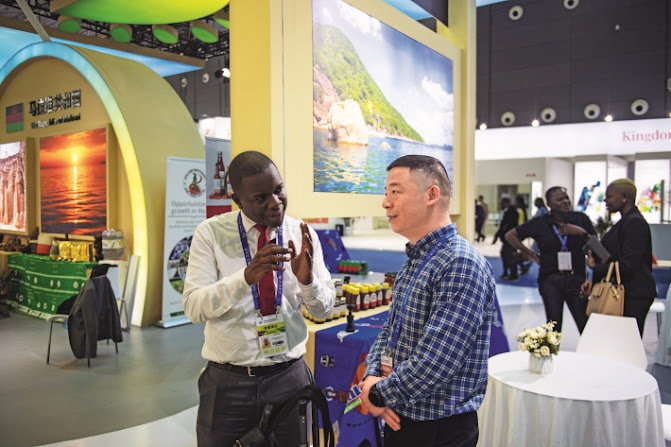By Derrick Silimina
Like many farmers, Monica Haraba wakes up at 5:00 a.m. to get ready to harvest her soya bean crop at her farmland located on the outskirts of Lilongwe, Malawi’s capital.
But like last year, she is expecting lower output due to adverse weather, especially drought.
“Because of poor weather conditions, I managed to harvest only 200 bags of soybeans, each weighing 50 kg during the 2022/2023 farming season, compared to 600 bags in the previous season, on my 8 acres (3.23 hectares) of land,” Haraba told ChinAfrica.
Haraba intends to sell her yield to local processing companies that process soya beans into finished products including cooking oil, soymeal and stock feed, among others. According to Malawi’s Ministry of Agriculture, minimum farm gate prices for strategic crops such as soya bean for the 2023/2024 season is pegged at 800 Malawian kwacha ($0.46) per kg.
In a country where more than 80 percent of the economy is based on agriculture, farming touches nearly everyone’s life in one way or another.
Soya bean is one of the most important food and cash crops in Malawi as it is a good source of protein, vitamins and vegetable oils.
But low commodity prices have hit the farmers hard who are already struggling with drought. In this context, the recent agreements with China to export Malawi’s soya beans to the country has been cheered by Malawian farmers and traders. China’s huge demand for soya beans can significantly lift the incomes of the producers.
Positive development
On average, the Southern African country produces 400,000 tonnes of soya beans, and plans to raise the figure to 1 million tonnes by 2030 in line with Malawi 2063, the country’s long-term development strategy, to increase demand for exports.
During the China International Import Expo held in 2023 where Malawi showcased its products and services, over 39 Chinese companies expressed interest in buying Malawian agricultural commodities including soya beans.
“The mission to China was extremely beneficial for Malawi. We attracted over $140 million in export inquiries from 39 potential buyers who are interested in buying soya beans, cassava and groundnuts,” said Deliby Chimbalu, a public relations manager with the Malawi
Investment and Trade Centre
In 2023, Malawi exported $6.9 million worth of soya beans, a rise from $2 million the previous year, according to the Malawi Government Annual Economic Report 2024.
In this context, China and Malawi have signed export deals on soya beans as well as other commodities such as macadamia nuts and dry chillies. Negotiations are underway to sign protocols on tobacco, tea and ornamental fish.
The Farmers Union of Malawi (FUM) described the export deal for agricultural commodities with China as a positive development.
“The farmers are definitely very happy because we know now that after working hard in our fields and after harvesting, we won’t have challenges with marketing our produce,” FUM President Frighton Njolomole said, adding that the agreement will play a critical role in boosting the country’s agricultural sector.
The efforts culminated in the approval of the export of a trial consignment of 240 tonnes from Paramount Holdings Ltd. “This is the beginning for Malawi, and with high demand for soya beans from China, this opens doors for local soya bean farmers and traders,” Paramount Managing Director Mahesh Ghedhia said recently.
Ghedhia disclosed that his company signed a contract for exports of 20,000 tonnes after it emerged successful in the accreditation process by the Chinese authorities to ascertain the quality of the product for export to China.
Lucrative market
As the second-largest economy in the world, China is the largest importer of agricultural produce and is one of the most lucrative export markets for Malawian agricultural commodities such as soya beans.
“This shipment opens a door for Malawian farmers and we plan to increase our volumes because the Chinese market is looking for 100,000 tonnes of soya beans,” Ghedhia was cited by the Xinhua News Agency as saying.
According to Paramount, the exports are subject to waivers that Malawi’s Ministry of Trade and Industry and the Ministry of Agriculture would give to exporters as the produce is under export restrictions.
Chinese Ambassador to Malawi Long Zhou recently highlighted achievements made between China and Malawi through the Preferential Trade Agreement and presented a roadmap for enhancing relations.
“The deal aims at cementing the partnership between the two countries,” Long said recently.
The Chinese envoy lauded the success scored in the area of agriculture, particularly Malawi’s ability to start utilising the duty-free and quota-free export market access of soya beans with the first consignment shipped to China.
The Malawian government has since described the deal as a game-changer that will transform Malawi’s export base currently dominated by tobacco.
Minister of Trade and Industry Sosten Gwengwe recently indicated that the Chinese authorities were doing their accreditation of individual exporters of all the accredited commodities to ensure they meet standards.
“Those exporters that have been accredited will be given waivers on the export restrictions because they ought to fulfil contracts they signed with the Chinese importers,” he said.
Agricultural experts believe that China has untapped potential for soya bean exports, stressing the need for Malawi to exploit this market opportunity that could increase its forex earnings by 20 to 30 times if more commercial farmers with large landholdings enter the industry and access the Chinese market.
According to the United Nations Conference on Trade and Development, soya beans are in great demand both for the production of protein-rich meals and for livestock feed.
With the high demand of soya beans in the international market, especially in China, Haraba and other local farmers are optimistic about the future for the soya bean farming.
“I want to ramp up production in the next farming season so that I can supply at least 1,000 50-kg bags of soya beans to firms linked to the lucrative Chinese market,” Haraba said.
